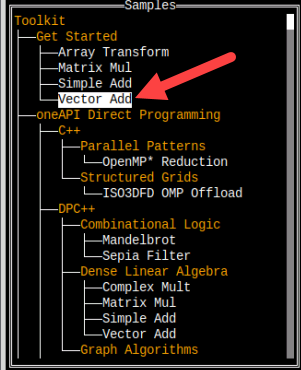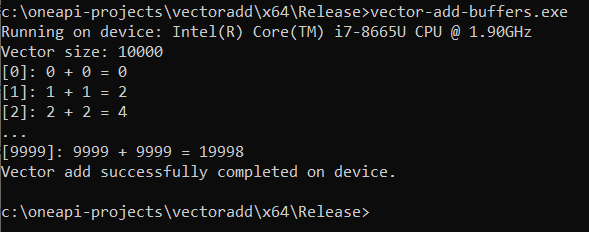Run a Sample Project Using the Visual Studio*Command Line
Intel® IoT Toolkit
Command line development can be done with a terminal window or done through Visual Studio Code*. Some tasks can be automated using extensions. To learn more, see Using Visual Studio Code with Intel® oneAPI Toolkits.
To compile and run a sample:
- Download the sample using the oneAPI CLI Samples Browser.
- Compile and run the sample with Microsoft Build*.
Download Samples using the oneAPI CLI Samples Browser
Use the oneAPI CLI Samples Browser to browse the collection of online oneAPI samples. As you browse the oneAPI samples, you can copy them to your local disk as buildable sample projects. Most oneAPI sample projects are built using Make or CMake, so the build instructions are included as part of the sample in a README file. The oneAPI CLI utility is a single-file, stand-alone executable that has no dependencies on dynamic runtime libraries.
An internet connection is required to download the samples for oneAPI toolkits. For information on how to use this toolkit offline, see Developing with Offline Systems in the Troubleshooting section.
- Create a folder where you want to store your sample. For example, C:\samples\vector-add
- Open a command window.
- Set system variables by running setvars:
"C:\Program Files (x86)\Intel\oneAPI\setvars.bat"
The command above assumes you installed to the default folder. If you customized the installation folder, setvars.bat is in your custom folder.NOTE:For Windows PowerShell* users, execute this command:cmd.exe "/K" '"C:\Program Files (x86)\Intel\oneAPI\setvars.bat" && powershell'
NOTE:The setvars.bat script can be managed using a configuration file, which is especially helpful if you need to initialize specific versions of libraries or the compiler, rather than defaulting to the "latest" version. For more details, see Using a Configuration File to Manage Setvars.bat.. SeeoneAPI Development Environment Setup for more configuration options.
- In the same command window, run the application : The oneAPI CLI menu appears:

- Move the arrow key down to select Create a project, then press Enter. The language selection will appear. If you installed Intel® oneAPI Base Toolkit, but you want to work with the Intel® IoT Toolkit and samples, ensure the IoT toolkit is installed. If it is not installed, install the toolkit then return to step 1 of this procedure.

- Select the language for your sample. For your first project, select cpp, then press Enter. The toolkit samples list appears.
- Select the Vector Add sample. Vector Add is a simple test application that will help verify that the tools are setup correctly and can access your system's GPU:

After you select a sample, press Enter.
- Specify the location for the project. The default location includes the path from where the utility was run and the name of the project.
Press Tab to select Create, then press Enter:

Now that you have a sample downloaded, compile and run the sample with CMake:
Build and Run a Sample Using Microsoft Build*
- Using the same command prompt window where you ran setvars.bat, navigate to the folder where you downloaded the sample (where the .sln file is located).
- Build the program:
MSBuild vector-add.sln /t:Rebuild /p:Configuration="Release"
- Navigate to the Release folder (example: x64/Release)
- Run the program:
A success message will appear:

If Running on Device shows a GPU and an error occurs, see the Troubleshooting tip for fixing a SPIRV Error.
See Explore SYCL* Through Samples to learn more.